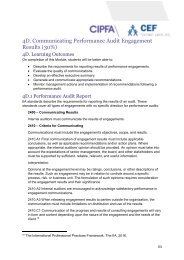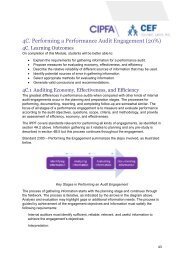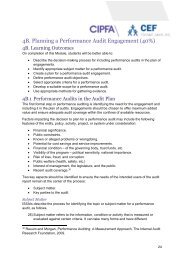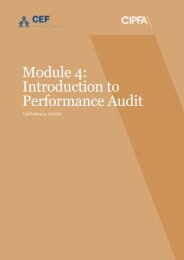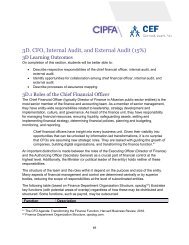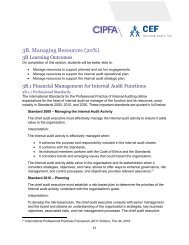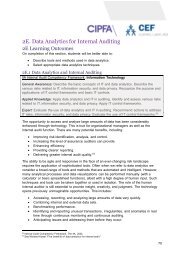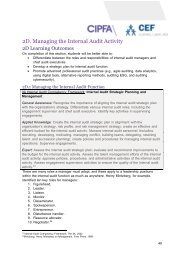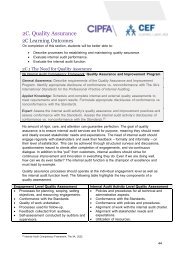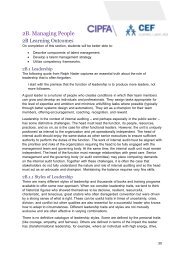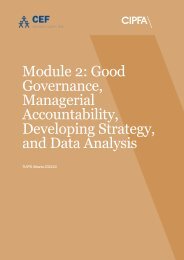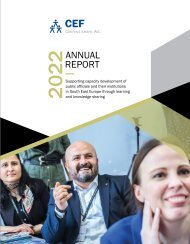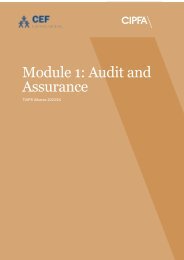CEF Annual report 2021
Create successful ePaper yourself
Turn your PDF publications into a flip-book with our unique Google optimized e-Paper software.
70 <strong>CEF</strong> FINANCIAL REPORT <strong>2021</strong><br />
NOTES TO THE FINANCIAL STATEMENTS 71<br />
(E) SHORT-TERM DEFERRED COSTS AND ACCRUED REVENUE<br />
Costs that will occur in the next financial year, but were already paid in the financial year, are<br />
recorded as short-term deferred costs.<br />
Short-term accrued revenues are revenues where costs occurred in the financial period but the<br />
formal <strong>report</strong> and reimbursement request will be submitted to the donor in the next financial year.<br />
(F) EMPLOYEE EARNINGS<br />
Liabilities from short-term employee earnings are measured on an undiscounted basis and are<br />
recognized as expenses as soon as the work is performed by an employee and comprise basic<br />
gross salary, allowances, and benefits.<br />
(G) SHORT-TERM ACCRUED COSTS AND DEFERRED REVENUE<br />
The <strong>CEF</strong> records short-term deferred revenues for revenues from projects that were received in<br />
the financial year (as advance payments) for deliverables due in the next financial year.<br />
The <strong>CEF</strong> <strong>report</strong>s short-term accrued costs for materials and services that were delivered in the<br />
financial year, but for which invoices will be received in the next financial year.<br />
(I) REVENUE<br />
Revenue is recognized as follows:<br />
For long-term projects, the revenue from services rendered is recognized based on the stage of<br />
completion as at the balance sheet date. Under this method, the revenue is recognized in the<br />
accounting period in which the services are rendered.<br />
Grants<br />
All types of grants are recognized in the financial statements when the <strong>CEF</strong> submits a <strong>report</strong><br />
and/or issues a reimbursement request or a payment request. In addition, they are recognized in<br />
deferred revenues when the work was done but the <strong>report</strong> was not submitted by the end of the<br />
financial year.<br />
Deferred/accrued revenues and expenses<br />
The <strong>CEF</strong> records in short-term deferred revenues advance payments received for projects with<br />
expected deliverables in the next financial year. Short-term accrued revenues comprise revenues<br />
generated from activities delivered in the financial year that will be <strong>report</strong>ed and paid for in the<br />
next financial year.<br />
The <strong>CEF</strong> records in short-term deferred costs expenses that were paid in the financial year (such<br />
as advance payments) that will occur in the next financial year, and in short-term accrued costs<br />
expenses in the financial year for which invoices have not yet arrived.<br />
(H) PROVISIONS<br />
Provisions are recognized for legal or constructive obligation as a result of a past event that can<br />
be measured reliably, and it is probable that an outflow of economic benefits will be required to<br />
settle the obligation. Provisions are determined by discounting expected future cash flows at a<br />
pre-tax rate that reflects current market assessments of the time value of money, and—where<br />
appropriate—the risks specific to the liability.<br />
Provisions for severance payments and long-service bonuses<br />
Pursuant to the internal rules, the <strong>CEF</strong> is obliged to pay long-service bonuses and severance<br />
payments to employees and has created long-term provisions for this purpose. There are no other<br />
obligations relating to pensions. Provisions are created in the amount of estimated future severance<br />
payments and long-service bonuses, discounted at the end of the <strong>report</strong>ing period.<br />
The <strong>CEF</strong> created non-current provisions in 2018 for long-service bonuses and severance payments<br />
at retirement as the present value of future payments required to settle liabilities arising<br />
from employees’ service in the current and future periods, taking into account the costs of severance<br />
payments at retirement and the costs of all expected long-service bonuses until retirement.<br />
A discount rate of 1.169% was set for the calculation on December 31, <strong>2021</strong> based on the yields<br />
on 15-year corporate bonds with high credit rating in the euro area. The calculation was prepared<br />
by an outsourced actuary.<br />
Labor costs and interest expenses are recognized in the income statement, while recalculated<br />
post-employment benefits and unrealized actuarial gains or losses from severance pay are recognized<br />
as an equity item in other comprehensive income.<br />
(J) FINANCIAL INCOME AND FINANCIAL EXPENSES<br />
Financial income includes interest from deposits and positive exchange rate differences.<br />
Financial expenses include negative exchange rate differences.<br />
(K) INITIAL APPLICATION OF NEW AMENDMENTS TO THE EXISTING STANDARDS<br />
EFFECTIVE FOR THE CURRENT REPORTING PERIOD<br />
The following new standards, amendments to the existing standards and interpretation issued by<br />
the International Accounting Standards Board (IASB) are effective for the current <strong>report</strong>ing period:<br />
• Amendments to IFRS 9 “Financial Instruments”, IAS 39 “Financial Instruments: Recognition<br />
and Measurement”, IFRS 7 “Financial Instruments: Disclosures”, IFRS 4 “Insurance Contracts”<br />
and IFRS 16 “Leases” – Interest Rate Benchmark Reform – Phase 2 (effective for<br />
annual periods beginning on or after 1 January <strong>2021</strong>),<br />
• Amendments to IFRS 16 “Leases” – Covid-19-Related Rent Concessions (effective for annual<br />
periods beginning on or after 1 June 2020. Earlier application is permitted),*<br />
• Amendments to IFRS 4 “Insurance Contracts” – Extension of the Temporary Exemption from<br />
Applying IFRS 9 (the expiry date for the temporary exemption from IFRS 9 was extended to<br />
annual periods beginning on or after 1 January 2023).<br />
The adoption of these new standards, amendments to the existing standards and interpretation<br />
has not led to any material changes in the <strong>CEF</strong>s financial statements.



